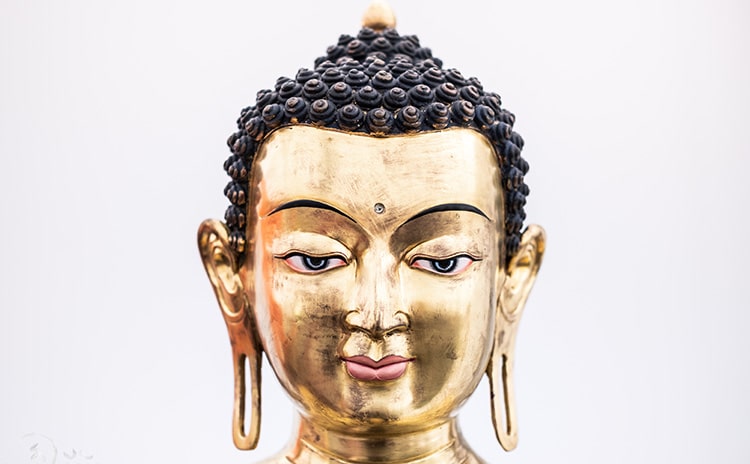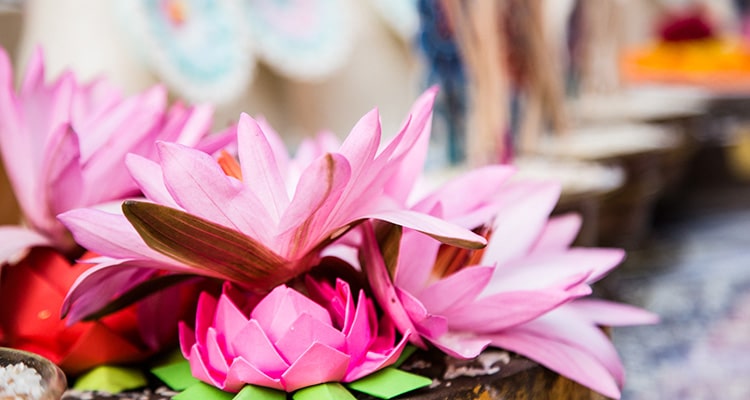Why Is Renunciation Important for Buddhist Practice?
Category: Buddhist Path

Buddhist Renunciation Explained (Benefits & How to Practice)
When people think of Buddhist renunciation they might picture an austere monk, wearing robes and living simply. Such imagery leads to fear around renunciation as a directive to give up all that’s pleasurable in life. But true renunciation differs from deprivation. Buddhist renunciation is an important part of the practice. Practicing renunciation helps us develop wisdom. At the same time, renunciation naturally arises as wisdom does.
In our current, unawakened state, the mind is outwardly focused. We seek pleasure, solace and contentment from the people, places and things around us. Unfortunately, this is the cause of our suffering for these things are impermanent and as such, will someday disappoint. Pleasures of the senses may be capable of offering us temporary relief, but they cannot offer true, lasting happiness.
At first, it’s hard to see the benefit of foregoing time spent on the pursuit of worldly pleasures. We’ve been conditioned to think that getting what we want and avoiding what we don’t want is the key to success. But as we practice renunciation and trade time spent pursuing that which we crave for time spent on meditation and deeper, inner work, things change.
We become more familiar with and accepting of the possibility there’s something else available that offers a greater payoff. As we catch glimpses of the benefits of renunciation, we gain deeper insight into this multi-layered Buddhist term. We become encouraged to turn further from outward pursuits to the lasting happiness that’s available within.
True Renunciation
There are several ways to explore the concept of Buddhist renunciation. Renunciation examples begin with the superficial, outward means of renunciation, such as minimizing the acquisition of material goods or quitting our jobs for a life in the woods.
This form of renunciation is what many people fear most, for we’ve spent a lifetime (or more) putting all our hopes into the accumulation of wealth, relationships or status as the solution to our pain. Letting go of the pursuit of outwardly-focused, capitalist goals may make true renunciation easier, but it is not actually necessary. For true renunciation takes place in the heart and mind.
True renunciation is the realization that happiness comes from within. It’s not a process of denying ourselves pleasure or withdrawing from participation in the outer world, but one of opening to the possibility that there exists something far more meaningful, beneficial and lasting.
What we actually renounce is not our hair, clothes, homes and cars, but the mistaken habit we have of thinking that these things could ever be the cause of our happiness. True renunciation is to renounce wrong view. This conditioned, habitual, reactionary, mistaken way of perceiving the world is the cause of our pain and suffering. We renounce the source of our suffering. Not people, places and things, but our attachment to those we like, and our aversion to those we don’t like.
In a sense, to become willing to let go of our mistaken view of reality is to be willing to let go of who we think we are. This is the ultimate renunciation, to let go of our sense of a separate self whose happiness is dependent on the labels of liked, wealthy, respected, feared, desired, or whatever it is we think makes us unique and thus more worthy than others.
When we renounce our clinging to an incorrect view of both reality and of ourselves, we become free from the suffering the Buddha described in the four noble truths.
How To Practice Renunciation
We are practicing renunciation each time we choose to meditate, to study, to learn more about the dharma and the Buddhist path. It’s also something that naturally arises as our wisdom does.
From one perspective, all Buddhist teachings are teachings on renunciation, on letting go. To realize the four seals of dharma is to realize there is nothing to grasp to. All conditioned things are impermanent, unsatisfactory, and empty of self. Our attempts at grasping or aversion only lead to disappointment, for the world around us will always change. Only nirvana offers pure, lasting bliss.
As we develop faith and trust in the intuitive wisdom that arises with the practice of meditation, renunciation just makes sense. It makes sense to accept reality as it is. By doing so, we let go of our attachment to pleasure and let go of our aversion to pain. This does not mean we no longer experience pleasure and pain, but rather, our capacity to be ok is no longer dependent upon being in a state of pleasure.
When our contentment is no longer dependent on needing anything to be just so, we become open to the perfection that is available at this moment. We become free to accept the fullness of our human-ness, and the complexity of our experience, just as it is. We become available to the presence of unconditioned bliss.








